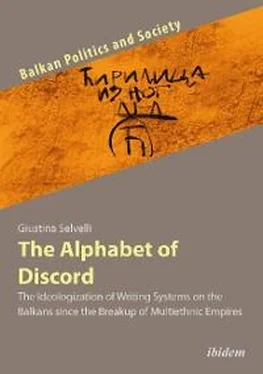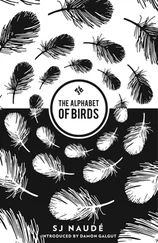Despite these stipulations, the educational question remained unresolved for a long time, since Greece was then struggling with serious demographic problems, during the war with Turkey, which caused the Asia Minor Catastrophe and the population exchange of 1923, bringing some 1.3 million people into Greek territory (see Pentzopoulos 2002). The Lausanne Convention of July 1923 ended the bloody Greek-Turkish conflict and established the borders between Greece, Bulgaria and Turkey (Kuševski 1983: 179). The arrival of a huge Greek population from neighboring Turkey led to the deterioration of conditions for the other minorities on Greek territory, including the Bulgarian minority in the region of Thrace and the so-called “Slavophone” 5minority in Aegean Macedonia. This provoked a reaction from Bulgaria, which had already turned to the League of Nations in March 1923 with a request to intervene to protect the Bulgarian population in West Thrace, denouncing, among other things, the closure of Bulgarian schools and churches by the Greek authorities (Kuševski 1983: 181).
As a result of the negotiations conducted with the League of Nations and in the spirit of the Sèvres Agreement, the Politis-Kalfov Protocol for the protection of the Greek minority in Bulgaria and the Bulgarian minority in Greece was signed in Geneva on 29 September 1924 by the Greek and Bulgarian Foreign Ministers, in the presence of a representative of the League of Nations. Contrary to expectations, however, the Greek Parliament later refused to ratify the Protocol, and tried to disrupt visits by League of Nations officials to the areas of interest in Aegean Macedonia (Michailidis 2005: 95). Indeed, the Greek government feared that the Slavophone population, which, despite the assumptions of the Protocol, was not considered as belonging to the Bulgarian ethnic group, might “pretend” to be such in order to profit from this position and embolden Sofia to strengthen its claims and influence in the region. This about-face by the Greek government was the subject of another meeting of the League of Nations, which called on Greece to implement the agreements reached earlier (Kuševski 1983: 184).
In its letter of reply, the Greek government contested the right of the Bulgarian government to interfere in its internal affairs, claiming that the participation of Bulgarian representatives in the Mixed Greco-Bulgarian Emigration Commission did not confer on the Bulgarian government any rights over the Slavic population living in Greek Macedonia (ibid., 185). 6The Greeks explained in a memorandum that they were confronted with the presence of various Slavic-speaking minorities rather than a single Bulgarian minority. It should be noted, however, that public opinion in the country was strongly against the recognition of any “Slavic” minority in Aegean Macedonia.
The League of Nations called upon the Greek government to meet the linguistic and educational needs of its minorities: as a consequence, Greece undertook to prepare textbooks and to appoint teachers for the education of the population concerned in its territories (cit. in Miletich 1925: 230). The next step, therefore, was to prepare a manual to serve as a reference for instruction. The Abecedar was printed in Athens in the summer of 1925, based on a hybrid dialect, a sort of mixture of the Florina and Prilep-Bitola varieties. The most important fact, however, is that it was written in Latin rather than Cyrillic letters: the alphabet used was based on Croatian latinica, to which some graphemes were added. This fact can be interpreted as a manifestation of Greek willingness to block further claims by Bulgaria and Serbia on the population in question, and thus to alienate their cultural influence through the highly symbolic use of an alternative writing system.
2.4 The publication of the Abecedar (1925)
The publication of the Abecedar by the Department for the Education of Foreign-Speakers in the Greek Ministry of Education in the autumn of 1925 was widely reported in the Greek press. Nikolas Zafiris, a publicist and specialist on Balkan issues, judged it an “extraordinary event” (cit. in Andonovski 1985: 4) in the life of minorities in Greece. In the daily Free Tribune (Elefthero Vima) of 19 October 1925, Zafiris wrote:
We have prepared the Abecedar for the Slavophones, which was compiled with care and good intention by the Greek specialists Papazahariou, Sagiaksis and Lazarou [...] The primer is intended for use in the schools that will soon be opened in Greek Macedonia and Western Thrace for the Slavic-speaking population. This primer will be used to teach the Slavophones in Greece. The Abecedar is printed in the Latin alphabet [...]. (cit. in Andonovski 1985: 4; my translation)
As expected, news of the publication of the Abecedar caused quite a stir in Bulgaria, sparking outrage over what was perceived as an affront to the country’s national identity and a new attack aimed at undermining the cultural unity between Bulgarians and Macedonians. With regard to the above-mentioned cultural rights, it can be said that, since in the Bulgarian national vision the authoritative cultural tradition was perceived as linked to the linguistic and written heritage (cf. Dečev 2014: 11), these rights were to some extent “alphabetic rights.” In this sense we can understand the Bulgarian desire to protect Cyrillic in the communities of Greek Macedonia, as well as later (as we shall see in the next chapter) in the country itself.
There were many Bulgarian expressions of indignation. The pro-government newspaper Word ( Slovo ) called the appearance of this primer “a triumphalist cynicism” (Shishmanov 1926: 4). In an article published on 10 October 1925, the newspaper Democratic Alliance ( Demokratičeski Sgovor ) noted that the primer produced by the Greek Ministry of Education was the first act of a “farce full of comic elements,” which turned out to be not funny at all, since the whole subject was “infinitely tragic and serious” (ibid., 5). This manual was also described as a provocation to the League of Nations itself, which was called upon to monitor the rights of minorities (ibid.).
Similarly, in an article published 17 October 1925, the Macedonian youth organization, in its newspaper Impetus (Ustrem), described the Abecedar as “a shameless monument to the barbarism and political arrogance of our democratic century, a diabolical and vile invention of Greek Bulgarophobia, the fruit of strong subtle calculations, germinated in a very lucid mind and in one of the murkiest of consciences” (cit. in Shishmanov 1926: 6; my translation). In autumn 1925, the Bulgarian delegate to the League of Nations, Dimitar Mikov, was given permission to report on what he saw as the Greek government’s negligence to comply with the needs of the Bulgarian minority, which continued to be denied access to educational institutions in its mother tongue. Mikov drew attention primarily to the primer itself, “a work of dubious respectability which made a very bad impression in Bulgaria” (cit. in Tramontano 1999: 323; my translation).
The publication of this primer in Latin letters irritated not only the Bulgarian government, but also that of Nikola Pašić in the Kingdom of Serbs, Croats and Slovenes. In particular, Pašić reacted by claiming that the Slavic population in Aegean Macedonia consisted of Serbs, a fact which legitimized his defense of the minority rights in this region (Kuševski 1983: 187). The thorny situation in Greece also became an object of interest for the League of Nations, and the petitions of the Kingdom of Serbs, Croats and Slovenes concerning the “Serb minority” in Greece, in the words of Director Erol Colban, added confusion to the complex mosaic of this Balkan region (ibid.).
Читать дальше












